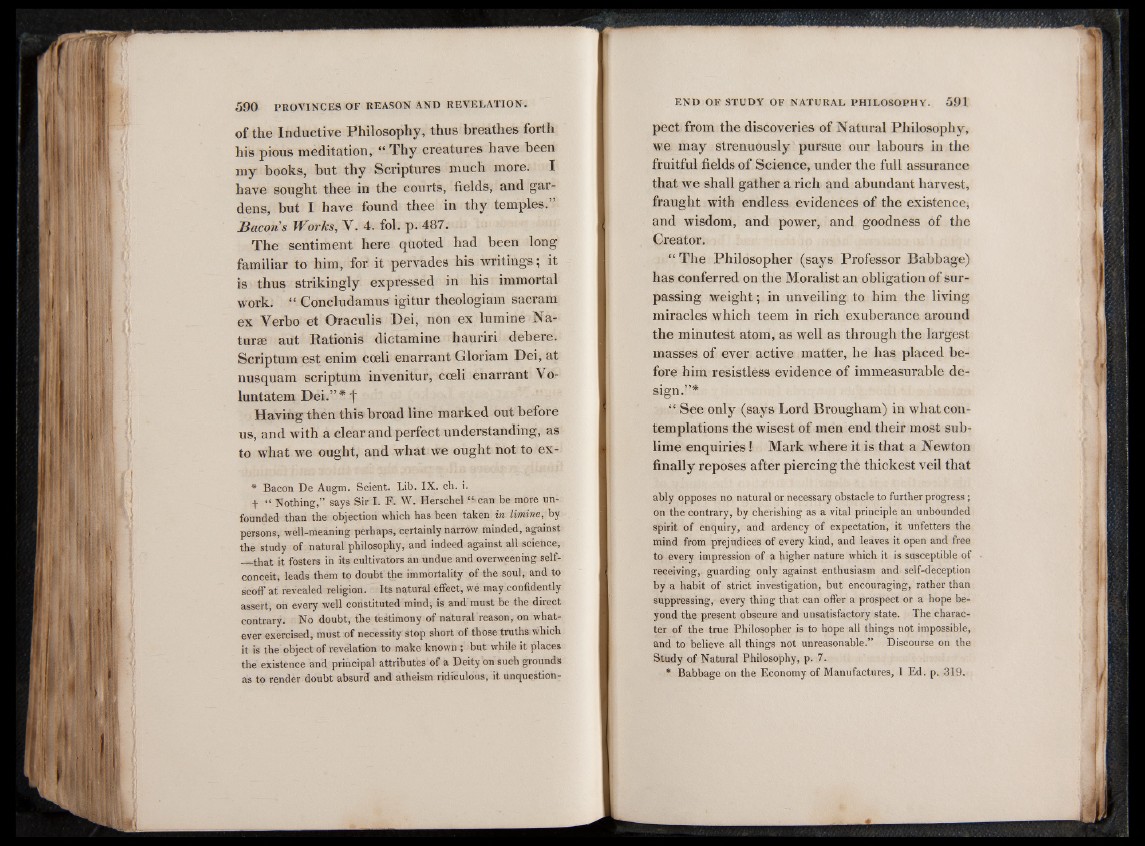
of the Inductive Philosophy, thus breathes forth
his pious meditation, “ Thy creatures have been
my books, but thy Scriptures much more. I
have sought thee in the courts, fields, and gardens,
but I have found thee in thy temples.
Bacons Works, V. 4. fol. p. 487.
The sentiment here quoted had been long
familiar to him, for it pervades his writings; it
is thus strikingly expressed in his immortal
work. “ Concludamus igitur theologiam sacram
ex Yerbo et Oraculis D e i, non ex lumine N a turae
aut Rationis dictamine hauriri debere.
Scriptum est enim coeli enarrant Gloriam D e i, at
nusquam scriptum invenitur, coeli enarrant Vo-
luntatem D e i.” * t
Having then this broad line marked out before
us, and with a clear and perfect understanding, as
to what we ought, and what we ought not to e x *
Bacon De Augm. Scient. Lib. IX. ch. i.
-f- “ Nothing,” says Sir I. F, W. Herschel “-«can be more unfounded
than the objection which has been taken in limine, by
persons, well-meaning perhaps, certainly narrow minded, against
the study of natural philosophy, and indeed against all science,
__that it fosters in its cultivators an undue and overweening selfconceit,
leads them to doubt the immortality of the soul, and to
scoff at revealed religion. Its natural effect, we may confidently
assert, on every well constituted mind, is and must be the direct
contrary. No doubt, the testimony of natural reason, on whatever
exercised, must of necessity stop short of those truths which
it is the object of revelation to make knownbut while it places
the existence and principal attributes of a Deity on such grounds
as to render doubt absurd and atheism ridiculous, it unquestionpect
from the discoveries of Natural Philosophy,
we may strenuously pursue our labours in the
fruitful fields o f Science, under the full assurance
that we shall gather a rich and abundant harvest,
fraught with endless evidences o f the existence,
and wisdom, and power, and goodness o f the
Creator.
“ The Philosopher (says Professor Babbage)
has conferred on the Moralist an obligation o f surpassing
w e ig h t; in unveiling to him the living
miracles which teem in rich exuberance around
the minutest atom, as well as through the largest
masses o f ever active matter, he has placed before
him resistless evidence o f immeasurable design.”*
“ S e e only (says Lord Brougham) in what contemplations
the wisest o f men end their most sublime
enquiries! Mark where it is that a Newton
finally reposes after piercing the thickest veil that
ably opposes no natural or necessary obstacle to further progress ;
on the contrary, by cherishing as a vital principle an unbounded
spirit of enquiry, and ardency of expectation, it unfetters the
mind from prejudices of every kind, and leaves it open and free
to every impression of a higher nature which it is susceptible of
receiving, guarding only against enthusiasm and self-deception
by a habit of strict investigation, but encouraging, rather than
suppressing, every thing that can offer a prospect or a hope beyond
the present obscure and unsatisfactory state. The character
of the true Philosopher is to hope all things not impossible,
and to believe all things not unreasonable.” Discourse on the
Study of Natural Philosophy, p. 7.
* Babbage on the Economy of Manufactures, 1 Ed. p. 319.